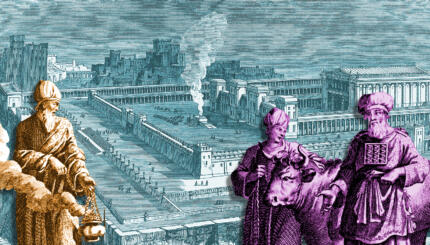The 17th of the month of Tammuz is observed as a minor fast day, with eating and drinking forbidden from dawn until sundown. Like Tisha B’Av, which comes just three weeks later, the 17th of Tammuz (often called by its Hebrew name, Shiva Asar b’Tammuz) is said to commemorate not to just one calamitous event in Jewish history, but several tragedies of the Jewish people.
The Mishnah in Taanit 4:6 lists five events that occurred on the 17th of Tammuz: Moses broke the tablets of law he had been given on Mount Sinai, the priests in the First Temple stopped offering the Tamid (daily) sacrifice because Jerusalem was besieged and they ran out of sheep, the walls of Jerusalem were breached by the Romans in the Second Temple Period, a Roman general named Apostomos burned a Torah scroll, and an idol was erected in the Temple by the Romans.
The minor fast also begins a period of mourning that lasts through Tisha B’Av, the major fast day that commemorates, among other things, the destruction of both the First and the Second Temples. During this three-week period some people abstain from listening to music, getting married, and cutting their hair.
During the morning service on the 17th of Tammuz, a paragraph is added to the Amidah prayer, Avinu Malkeinu is recited, and there is a special Torah reading. During the afternoon service, all of the changes to the morning service are repeated, and Ashkenazim read a special Haftarah from the Book of Isaiah.
With your help, My Jewish Learning can provide endless opportunities for learning, connection and discovery.
Tammuz
Pronounced: tah-MOOZ (oo as in boot), Origin: Hebrew, Jewish month that usually coincides with June or July.
Torah
Pronunced: TORE-uh, Origin: Hebrew, the Five Books of Moses.



